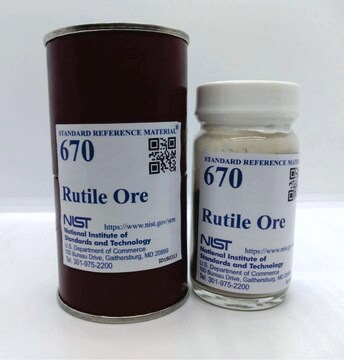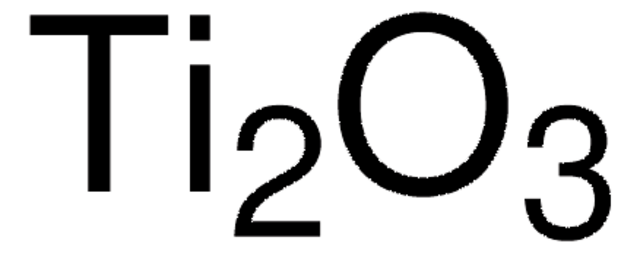635057
Titanium(IV) oxide, rutile
<001>, (single crystal substrate), ≥99.9% trace metals basis, L × W × thickness 10 mm × 10 mm × 0.5 mm
Synonym(s):
Titanium dioxide
About This Item
Recommended Products
grade
optical grade
Quality Level
description
single side polished
Assay
≥99.9% trace metals basis
form
(single crystal substrate)
(single side polished)
hardness
7 mohs
L × W × thickness
10 mm × 10 mm × 0.5 mm
transmittance
0.5-4.5 μm
mp
1840 °C
density
4.17 g/mL at 25 °C (lit.)
4.26 g/mL at 25 °C
semiconductor properties
<001>
SMILES string
O=[Ti]=O
InChI
1S/2O.Ti
InChI key
GWEVSGVZZGPLCZ-UHFFFAOYSA-N
Looking for similar products? Visit Product Comparison Guide
Related Categories
Features and Benefits
Physical properties
Physical form
Storage Class Code
11 - Combustible Solids
WGK
nwg
Flash Point(F)
Not applicable
Flash Point(C)
Not applicable
Personal Protective Equipment
Regulatory Listings
Regulatory Listings are mainly provided for chemical products. Only limited information can be provided here for non-chemical products. No entry means none of the components are listed. It is the user’s obligation to ensure the safe and legal use of the product.
ISHL Indicated Name
Substances Subject to be Indicated Names
ISHL Notified Names
Substances Subject to be Notified Names
JAN Code
635057-1EA:4548173358802
635057-BULK:
635057-VAR:
Choose from one of the most recent versions:
Already Own This Product?
Find documentation for the products that you have recently purchased in the Document Library.
Customers Also Viewed
Articles
A hard disk drive (HDD) is a data storage device that stores digital information by magnetizing nanosized magnets on flat disks and retrieves data by sensing the resulting magnetic field.
Building and Engineering Micro/Nano Architectures of Single-Walled Carbon Nanotubes for Electronic Applications
Spin-based electronic (spintronic) devices offer significant improvement to the limits of conventional charge-based memory and logic devices which suffer from high power usage, leakage current, performance saturation, and device complexity.
Nanomaterials are considered a route to the innovations required for large-scale implementation of renewable energy technologies in society to make our life sustainable.
Global Trade Item Number
| SKU | GTIN |
|---|---|
| 635057-1EA | 4061833314746 |
Our team of scientists has experience in all areas of research including Life Science, Material Science, Chemical Synthesis, Chromatography, Analytical and many others.
Contact Technical Service


